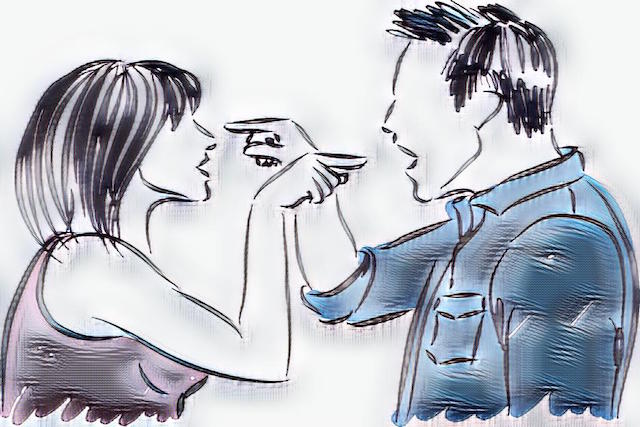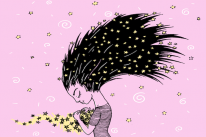
“Everything that irritates us about others can lead us to an understanding of ourselves.” ~Carl Jung
When my wife and I had children, little did we know that we’d be creating little bundles of nerves. Between my wife’s depression and my own anxiety, we created two anxiety-ridden, depressed balls of mess, and then some.
Don’t get me wrong, we love our two girls to death, and we are very proud of them. They are both very strong and beautiful young ladies. Occasionally we like hanging out with them too.
While the two girls have similar interests, their personalities couldn’t be more different. They both exhibit anxiety and depression, yet they show it in different ways. The oldest has panic attacks and hyperventilates, unable to stop herself from crying and heaving. The youngest just curls up in a ball and is unable to move or do anything.
We find it interesting that the qualities we love, and those we dislike, about both girls stem from both of us. It is as though the Universe took the best and the worst from both of us and amplified it in our children.
All That Talent Gone to Waste
My oldest daughter is naturally talented in many areas. She’s strong and athletic, she’s naturally artistic, she’s smart, and she also has a talent for music. She has a beautiful voice, and picked up playing classical guitar in almost no time.
What drives my wife crazy is that my daughter doesn’t realize how talented and gifted she is.
What drives me crazy is that she doesn’t develop that talent, and do something with it. She has so much potential.
As parents, it is easy for us to look at our children and wail and moan about their perceived shortcomings, their lost potential, and so forth. We know what they are going through, because we have both been there. We both struggle with anxiety, so we know what it looks like and how it affects our children.
In general, isn’t it easier to see the shortcomings that we perceive in other people, than our own?
Little Mirrors
What I’ve realized, however, is that our children mirror our own behaviors and attitudes as parents. What annoy us about our children’s personalities are often quirks we ourselves have.
This principle actually applies to all our relationships, not just with those of us with children. We should stop and ask ourselves, “Am I setting that example? Am I acting the same way?” Often, we don’t realize that what annoys us about someone else is actually an issue we ourselves have.
For instance, in extreme cases, children who exhibit violent behaviors often come from violent households. They are mirroring the behavior they have been exposed to at home.
In my wife’s case, it drives her crazy that my oldest daughter doesn’t realize how talented and gifted she is, even though my wife clearly sees it. Yet, when I look at my wife, I see the same thing in her! It is indeed ironic.
My wife doesn’t think she’s very talented or gifted, and wonders what people see in her. Obviously I saw something in her, because I married her! So the very issue that irritates my wife about my daughter is the very issue that she herself unconsciously struggles with.
So Much Potential…
What drives me nuts about my oldest daughter? It frustrates me that I see so much potential in her, and yet I don’t see her developing it. She has so much natural talent, she could be a leader. Her peers look up to her and admire her, and she doesn’t even realize it.
What does this say about me? Am I the same way?
Looking at myself through the same lenses, I am forced to laugh, because I do see the same thing! Like my daughter, I probably have many talents I don’t even realize I have. Looking at myself from the outside, I think I have the potential to be a leader as well, but I choose not to. I had so much potential…
Learning About Ourselves
From this perspective, I can’t really blame my daughter. I have social anxiety and don’t want to deal with people, and I know she does too. Often times I’ll go out of my way to avoid people. What I perceive as my daughter not developing her talents is more than likely her not wanting to be the center of attention. I can relate to that—I don’t like being the center of attention either.
I never thought I would be learning about myself from my own children. Sure, I figured they’d know more about new technologies than me, for example. When I have a question about how to do something on my iPhone, for instance, I go to them, and they can show me right away.
Yet, what my children are teaching me are what issues I need to deal with in myself. Perhaps I, too, have many skills and undeveloped potential, if only I could learn to manage my social anxiety. We often want our children to be different from us, to have different experiences. We don’t want them to go through the same things we struggled with, yet as much as we try or want to, we can’t change who they are.
We can, however, change ourselves. There is value in stopping to reflect on what frustrates you about your children, your family, or your friends. What behaviors irritate you? What do you think they could be doing better?
Then stop and look at yourself. Are you exhibiting the same behaviors? What could you be doing better? Are you making the changes in yourself that you’d like to see in your relationships?
Practice the Golden Rule
Of course as parents, we want to support our children and provide them everything they need to be happy, healthy, and successful. What parent doesn’t? It may frustrate us that they are not living up to their potential, as we see it—but the apple doesn’t fall too far from the tree. Are they mirroring our own behavior?
As parents, we show our children love and patience, but our expectations of them should follow the mirroring principle, or the golden rule—would we want to be held to the same standards? My daughter could be captain of the soccer team, but would I want to be one, if I was in her position? Probably not.
We could make our kids practice the piano for an hour every day, and do their homework for three hours after school. Would we want to do that? Probably not.
The mirroring principle with our children, family, and friends, then, goes both ways. What can we learn about ourselves from our relationships? Conversely, what should we expect from our family and friends, that we ourselves would be willing to do?
About José de la Torre
Known as the Be at Peace Coach, José de la Torre takes a holistic approach in helping clients overcome challenges, and helps them find peace, balance, health and wellness in their lives. Keep an eye out for his book, Spiritual Living for Busy People, coming out January 30, 2018 on Amazon.com. Find out more at jose-delatorre.com, or connect on Facebook.













 Though I run this site, it is not mine. It's ours. It's not about me. It's about us. Your stories and your wisdom are just as meaningful as mine.
Though I run this site, it is not mine. It's ours. It's not about me. It's about us. Your stories and your wisdom are just as meaningful as mine.
Great post with a lot of wisdom!!! Wonerful insight and points/quiestions to ponder and apply! Great message and perpective to share!!! 🙂
thank you!
I think you should change “had so much potential” to “have so much potential” Your life isn’t over yet bud
hmm, good point!
I’m 21 years old with no children, but this will certainly help me in my friendships. People forget the importance of introspection. Thank you, José!
Shalom
Shalom!
Lately I’ve been dealing w/ toxic co-workers. Instead of complaining about them this week, I will attempt to find some humanity in them.
hope it helps
Thanks José!
Thanks José!